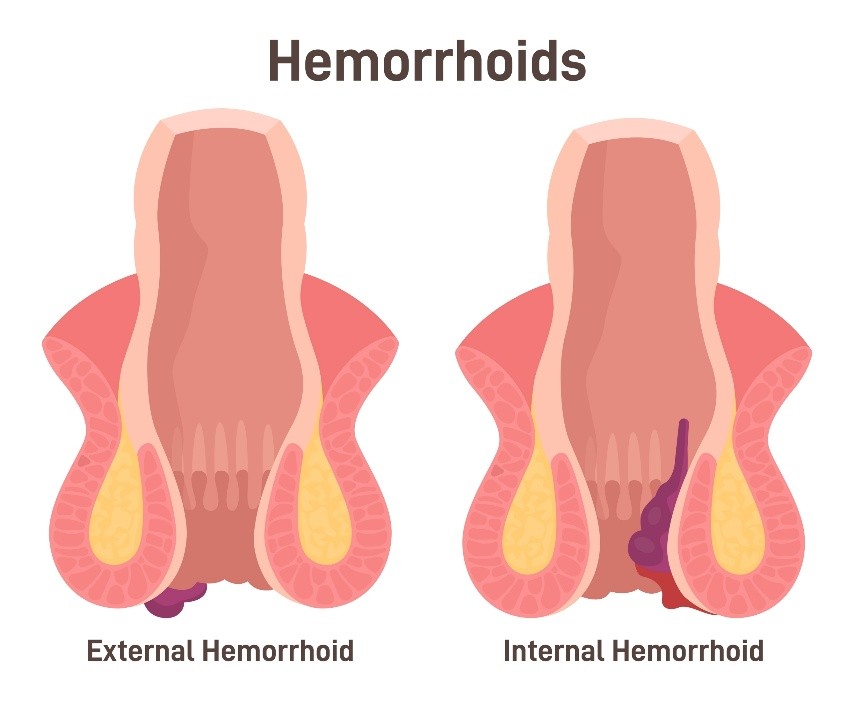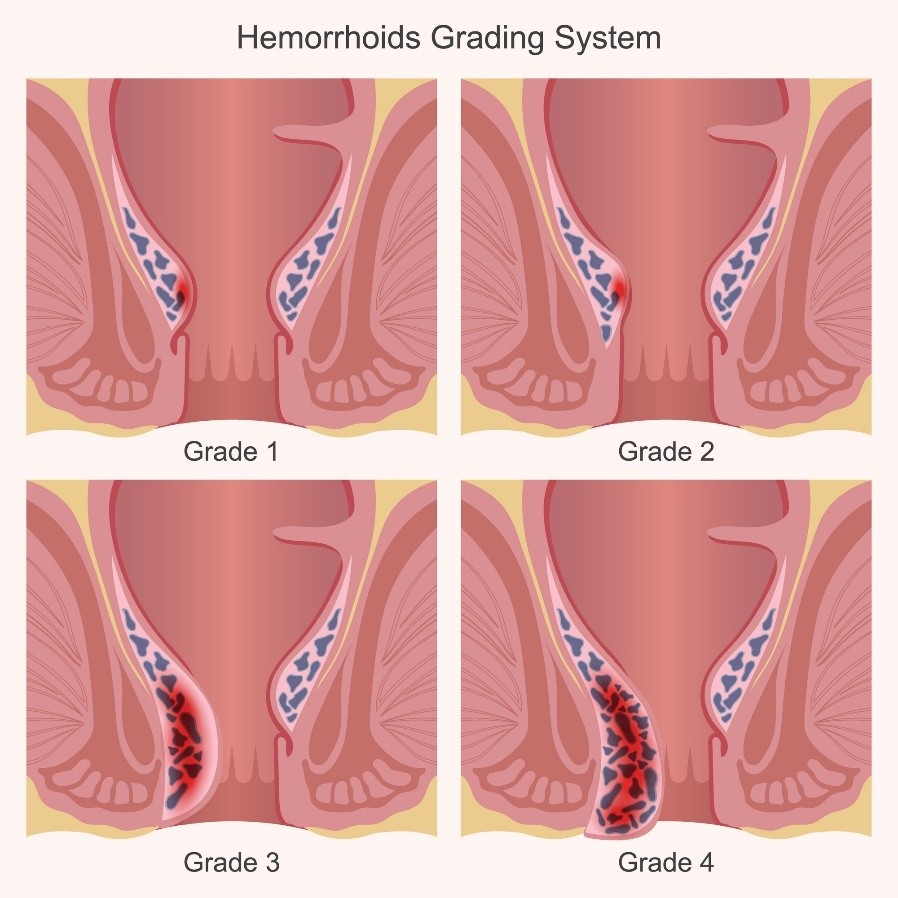Piles (Haemorrhoids) Surgery


In Singapore, haemorrhoids, or piles, affect 1 in 3 individuals. This condition is particularly prevalent among those over 40 and during pregnancy. As haemorrhoid symptoms can cause patients great distress, timely medical attention is essential.
Read on to learn about haemorrhoids, including what causes them, how to recognise the symptoms, and the treatment options that can provide relief. This guide also explains when to seek medical care in Singapore and what to expect before and after treatment.
Over long periods of time, the elasticity of the supporting tissues is weakened and it becomes increasingly difficult for these enlarged blood vessels to return to their original positions in the anal canal, leading to the formation of external piles
Who Is Most Likely to Develop Piles?
Haemorrhoids can happen to anyone, but they usually affect:
- People aged between 45 to 66 years old
- Pregnant women
- People who are obese
- People with a family history of haemorrhoids
- People who suffer from chronic diarrhoea or constipation
- People who engage in heavy lifting
What Are the Causes of Piles / Haemorrhoids?
Piles develop as a result of increased pressure in the rectum, causing the veins in the rectum and anus to become swollen. Factors that can cause increased pressure include:
- Excessive straining during bowel movements
- Regularly lifting heavy weights
- Chronic constipation or diarrhoea
- Pregnancy
- Obesity
- Sitting for prolonged periods
- Having a low-fibre diet
What Are the Symptoms to Look Out For?
Signs and symptoms vary depending on the type and grade of piles.
Internal haemorrhoids: Patients with internal haemorrhoids seldom notice symptoms, but excessive straining during a bowel movement may result in painless rectal bleeding or cause the haemorrhoid to prolapse. In cases of piles that have prolapsed and are unable to be pushed back in, surgical piles treatment is usually necessary.
External Haemorrhoids: These are haemorrhoids that develop outside the anus, and are visible and palpable. Patients may experience symptoms such as:
- Pain and itching around the anus
- Swelling around the anus
- Rectal bleeding
- Feeling a sensation of a lump around the anus

What Are the Different Types of Piles?
Haemorrhoids can be classified into 3 main types:
Internal Haemorrhoids
: Internal haemorrhoids develop inside the rectum above the dentate line. They can vary in size and are often characterised by bleeding during bowel movements. However, it does not usually cause discomfort or pain unless it has prolapsed and develops a blood clot (thrombosis).Prolapsed Haemorrhoids
: Prolapsed haemorrhoids are internal haemorrhoids that have already prolapsed (protruded) from the rectum. This causes pain and discomfort when sitting or during bowel movements. Piles surgery in Singapore may be recommended to remove the haemorrhoid if it bleeds a lot, and causes pain and discomfort.External Haemorrhoids
: External haemorrhoids happens just under the skin around the anus. Patients diagnosed with external haemorrhoids typically experience itching and bleeding, and may also feel a firm lump near the anus. External haemorrhoids can become painful if they form a clot called a thrombus, and might then need to be assessed by a haemorrhoid surgeon.
How are piles classified?
Piles can happen both inside and outside the anus. They are divided into 4 grades based on their size and symptoms:
Grade I
: Enlarged internal piles that usually present with bleeding during defecation. These can be easily treated with medication.Grade II
: These larger piles tend to protrude out during straining at stools but are able to spontaneously return back into the anal canal after bowel movement.Grade III
: These large piles protrude during defecation causing significant bleeding and remain outside the anus. Some finger pressure may be able to push it back inside the anus.Grade IV
: These piles are persistently outside the anus and the blood in these engorged vessels is usually clotted, leading to extremely painful and swollen lumps that require surgery to achieve relief.

While most piles cause minimal discomfort and often resolve on their own, several complications can still possibly occur, including:
- Anaemia: Chronic blood loss from haemorrhoids can lead to anaemia over time. This condition occurs when the body does not have enough red blood cells.
- Thrombosed Haemorrhoid: This occurs when a blood clot forms within a haemorrhoid. The haemorrhoid may appear bluish due to the clot.
- Strangulated Haemorrhoid: This is a life-threatening complication where the prolapsed internal haemorrhoid becomes trapped outside the anus, cutting off its blood supply. If not treated promptly, the haemorrhoid tissue can die and cause sepsis.
What Are the Treatment Options for Piles / Haemorrhoids?
Conventional Haemorrhoidectomy
In conventional haemorrhoidectomy, the piles surgeon utilises an instrument with a high-energy electrical current that cuts off the tissues and stops bleeding at the same time. This is the usual method employed for grade III or IV piles.
Conventional haemorrhoidectomy is usually performed by a piles surgeon under general or regional anaesthesia and may require hospitalisation. This procedure can be performed as a day surgery and patients can be discharged the same evening. The wound is usually left open to heal on its own over a 4 to 6-week period or closed with sutures to shorten the healing time.Stapled Haemorrhoidectomy
Stapled haemorrhoidectomy is a more advanced procedure usually performed under general or regional anaesthesia. The piles are pushed back into their normal positions within the anal canal. A stitch is then placed around the anal canal and then used to pull the hemorrhoidal tissue into the stapler. The stapler is fired and the piles are removed, while the remaining tissues are simultaneously stapled together.
This interrupts the blood supply to the piles, and the loose anal skin is also pulled back up into the anal canal. Stapled haemorrhoidectomy is generally less painful and has a shorter recovery time compared to conventional haemorrhoidectomy. Most patients should recover within 1 to 2 weeks.Trans-anal Haemorrhoidal De-arterialization (THD)
During Trans-anal Haemorrhoidal De-arterialization (THD), a special device is inserted through the anus and the blood vessels connecting to the piles are precisely located using Doppler ultrasound, and then tied off using surgical stitches.
This helps interrupt the blood supply to the piles and is suitable for piles not too large or are prolapsing, with bleeding as the predominant symptom. Since it does not involve cutting off any tissue, there is generally minimal post-operative discomfort and no need to be off work post-procedure.Rubber-Band Ligation
Ligation of piles is an outpatient treatment that can be performed in the clinic by a piles surgeon without anaesthesia. In this procedure, a small rubber band is applied to the base of the piles, stopping the blood supply to the piles. The piles will then shrivel and die within 3 to 5 days, falling off during normal bowel movements.
It is usually not possible for the patient to discern the shedding of the shrivelled piles, although some mild bleeding during defecation in the first week might be expected. The scarring that forms will prevent further prolapse and bleeding. Because it is only possible to ‘pinch’ off a small portion of the pile at any one time, a large prolapsing pile may sometimes require 2 to 3 repeat ligations 6 weeks apart to achieve the desirable effect. Most patients should be able to return to work the next day.
Call us today at +65 6433 1005 to schedule an appointment and let us discuss your concerns and recommend the most suitable treatment option for you.
Piles FAQs
What are the methods for treating piles?
Depending on the severity, piles can be treated via dietary changes, medication or surgical methods. Upon examination by a colorectal specialist, grades I and II piles may be treated with simple medications or rubber-band ligation in the clinic on the same day, while larger symptomatic piles of grades III and IV usually require piles surgery.
Is surgery recommended for piles?
The aim of a piles surgery is to relieve any symptoms of pain, swelling and bleeding. This may involve surgical dearterialisation of grade III or IV piles. When symptomatic piles have progressed to a stage where treatment with medication or less invasive procedures such as rubber band ligation is not enough to alleviate the symptoms, haemorrhoids surgery is recommended.
How much does a piles surgery cost? Can MediSave be used?
The cost of piles treatment will depend on what modalities are used for treatment, whether hospitalisation is needed and whether any disposable equipment (e.g. stapling device) is used. A consultation and physical examination is required to determine the mode of treatment.
For Singapore citizens, piles surgery can be reimbursed by MediSave, subjected to the amount claimable imposed by the CPF Board.
How long does piles surgery take? Do I need to be hospitalised?
Piles surgery, if needed, can be arranged on the same day or the following day after consultation. Surgery should take less than 30 minutes and is usually performed as a day surgery. An overnight hospitalisation stay is usually not required.
Is piles surgery painful? What is the recovery period like?
The extent of discomfort and the recovery period vary depending on the treatment method. Newer methods of piles treatment are less painful, with faster recovery time and less time off work. The use of better and more effective painkillers further reduces any discomfort.
Our experienced piles surgeon in Singapore specialises in advanced techniques for haemorrhoids surgery.
Book a consultation at 6443 1005 for comprehensive piles treatment today.

With more than two decades of experience managing colorectal conditions, our colorectal surgeon Dr Kam Ming Hian is well-known for his expertise in diagnosing and treating various haemorrhoid conditions. He is a former Director of Robotics & Minimally Invasive Surgery in the Department of Colorectal Surgery, SGH. Dr Kam has successfully treated many patients and received multiple awards for service excellence during his career.
Read More![]()
20 Years of Colorectal Experience
![]()
Skilled in Minimally Invasive & Laparoscopic Techniques
![]()
Individualised & Cost Effective Treatment for Every Patient
![]()
Medisave and Insurance-Covered Treatment and Procedures
We are proud to provide patients with highly personalised and affordable colorectal treatments in Singapore. At Kam Colorectal Centre, we’ve got your colorectal health covered.
Call +65 6443 1005 or fill in the form below to book a detailed consultation with us.

